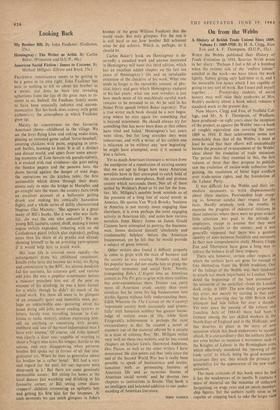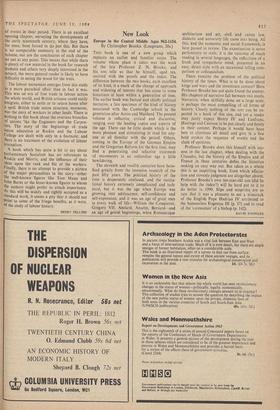On from the Webbs
A History of British Trade Unions Since 1889 Volume I : 1889-1910. By H. A. Clegg, Alai Fox and A. F. Thompson. (O.U.P., 55s.) WHEN the Webbs published their History o, Trade Unionism in 1894, Beatrice Webb wrote in her diary : 'Perhaps I feel a bit of a humbut when the reviews talk of the "endless labour' entailed in the work—we have taken the wort lightly, Sidney giving only half-time to it, and the miserable few hours which I am capable o giving to any sort of work. But I must pull mysel together. . .' Present-day students of socia history may well raise their eyebrows at Mrs Webb's modesty about a book which remains standard work to the present day.
Now Messrs. Clegg and Fox, of Nuffield Col lege, and Mr. A. F. Thompson, of Wadham have produced—in eight years since the inceptior of the project, as against the Webbs' two—a boot of roughly equivalent size covering the year 1889 to 1910. If their achievement seems les remarkable than that of the Webbs, it must a least be said that their efforts will undoubted) hasten the process of re-assessment of the Webbs ideas about the evolution of trade unionism The period that they examine in this, the firs volume of three that they propose to publish saw the evolution of nation-wide collective bar gaining, the resolution of bitter legal conflict over trade-union rights, and the foundation o the Labour Party.
It was difficult for the Webbs and their mediate successors to write dispassionate') about these matters. Partisanship kept creep' ing in, however careful their respect for thk facts. Hardly anybody took the trouble lc examine the progress of industrial relations it those industries where there were no great strikes little attention was paid to the attitude o employers, except to assume that they were universally hostile to the unions; and it was generally supposed that there was a gennini identity of aims between Socialists and unionists In their new comprehensive study, Messrs. Clegg Fox and Thompson have gone a long way Ic redress the balance in all these respects.
There are, however, certain other respects it which the authors have not gone far enough tc free themselves from the Webb tradition. on( of the failings of the Webb's was their tendency to attach too much importance to London. The) dated the beginnings of the 'new unionism'— the unionism of the unskilled—from the Londor dock strike in 1889. The new study perpetuate: this error, not merely by starting in that year but also by asserting that 'in 1889 British track unionism had lain fallow for over a decade. Yet ever since the passing of the reform anc franchise Acts of 1884-85 there had been 2 ferment among the less skilled workers in tla North-East of England and in the Midlands, anc this deserves its place in the story of nevi unionism which this book endeavours to recoup afresh. It is extraordinary that the authors shooknot even bother to mention a movement such a!
the Knights of Labour in the Birmingham area which effectively antedated the 'upswing of the trade cycle' to which, being the good economic historians they are, they attach the primary re' sponsibility for the appearance of the new trade unionism.
The main criticism of this book must be tha it has the weaknesses of its merits. It contains I mass of material on the minutiae of collective bargaining, on wage rates and on union member ship figures, but the authors rarely seem to be capable of stepping back to take the larger vie'
of events in their period. There is an excellent opening chapter, surveying the developments of the early nineteenth century, where they have, for once, been forced to do just this. But there is no comparable summary at the end of the volume, nor are the conclusions of each chapter set out at any point. This means that while there is plenty of raw material in the book for research students and others very deeply interested in the subject, the more general reader is likely to have difficulty in seeing the wood for the trees.
The labour movement emerges from this study as a more parochial affair than in fact it was. This was an era of free trade in labour across the whole world, and British artisans could easily emigrate, either to settle or to return home after a spell. British trade union structure, moreover, was the envy of workers in other lands. There is nothing in this book about the overseas branches of unions 'ike the Engineers and the Carpen- ters. The story of the beginnings of trade union education at Ruskin and the Labour College are dealt with only in a footnote; and there is no treatment of the evolution of labour Journalism.
A book which has quite a bit to say about Parliamentary Socialism has no references to Ruskin and Morris, and the influence of their ideas upon the rank and file of the workers. Finally, there is no attempt to provide a picture of the major personalities in the story--either the well-known figures like Tom Mann and John Burns or the lesser-known figures to whom the authors might prefer to attach importance. As this will be widely and rightly accepted as a standard work, it seems a pity that it should not Point to some of the fringe benefits, as it were, of the study of labour history.
HENRY FELLING































 Previous page
Previous page